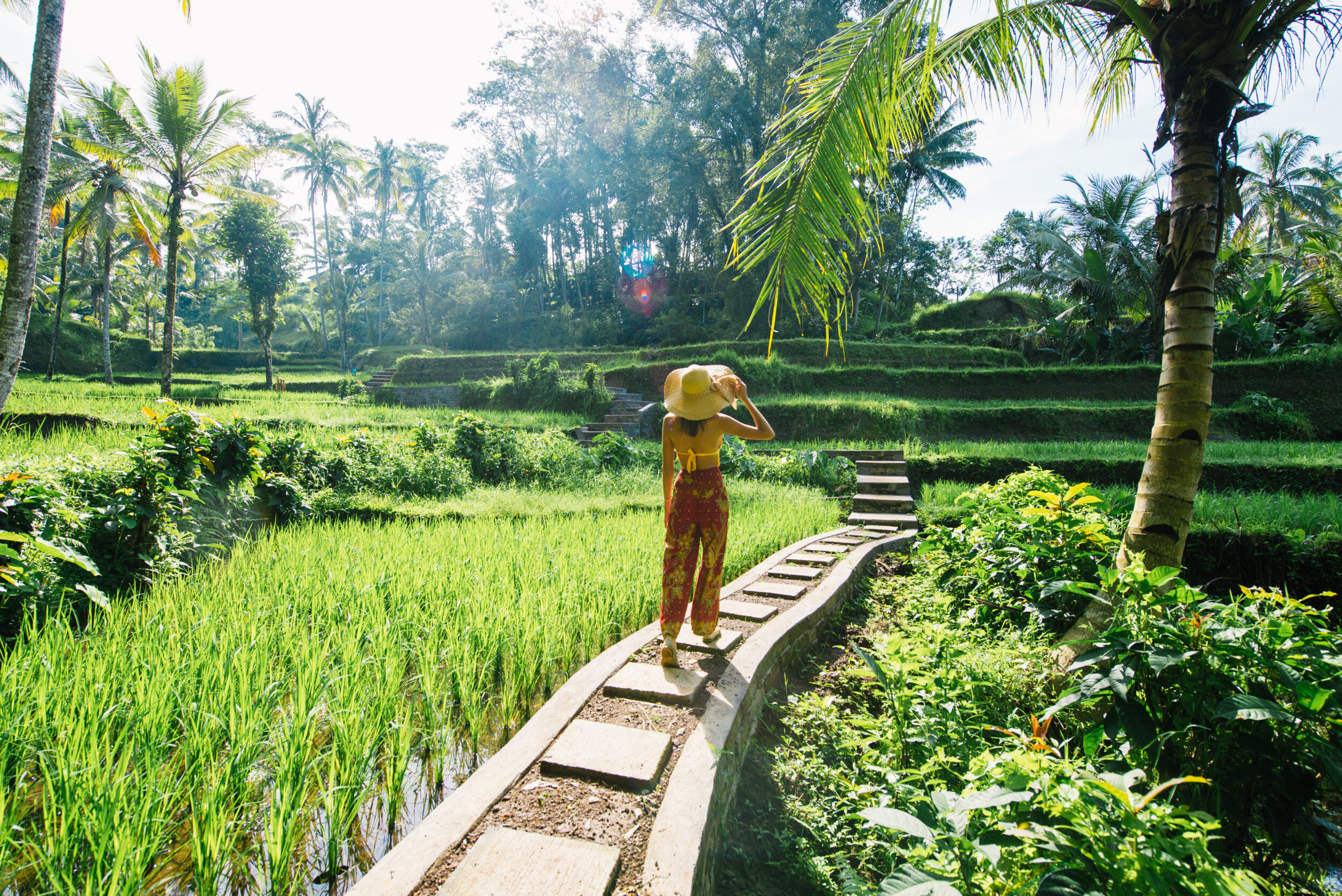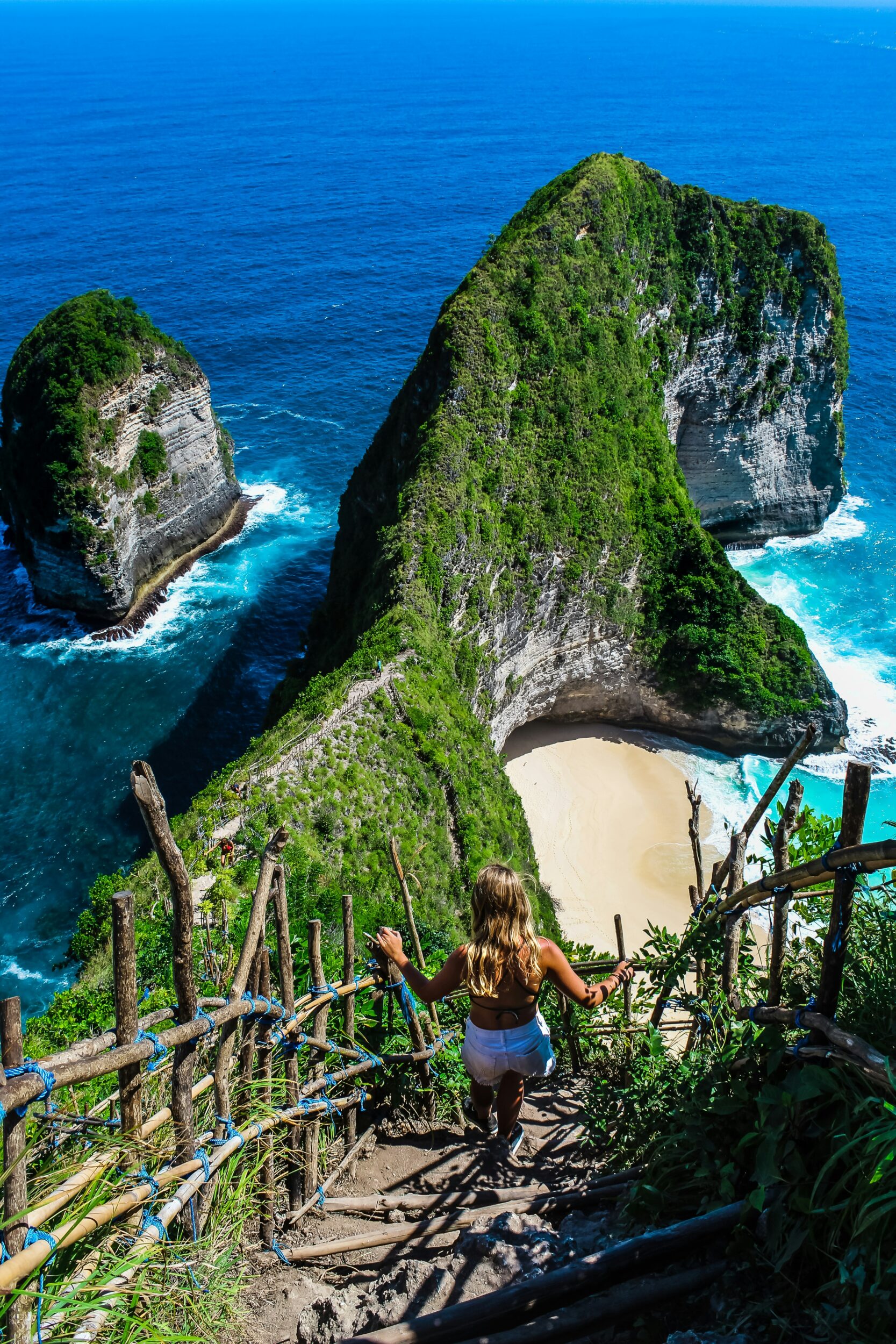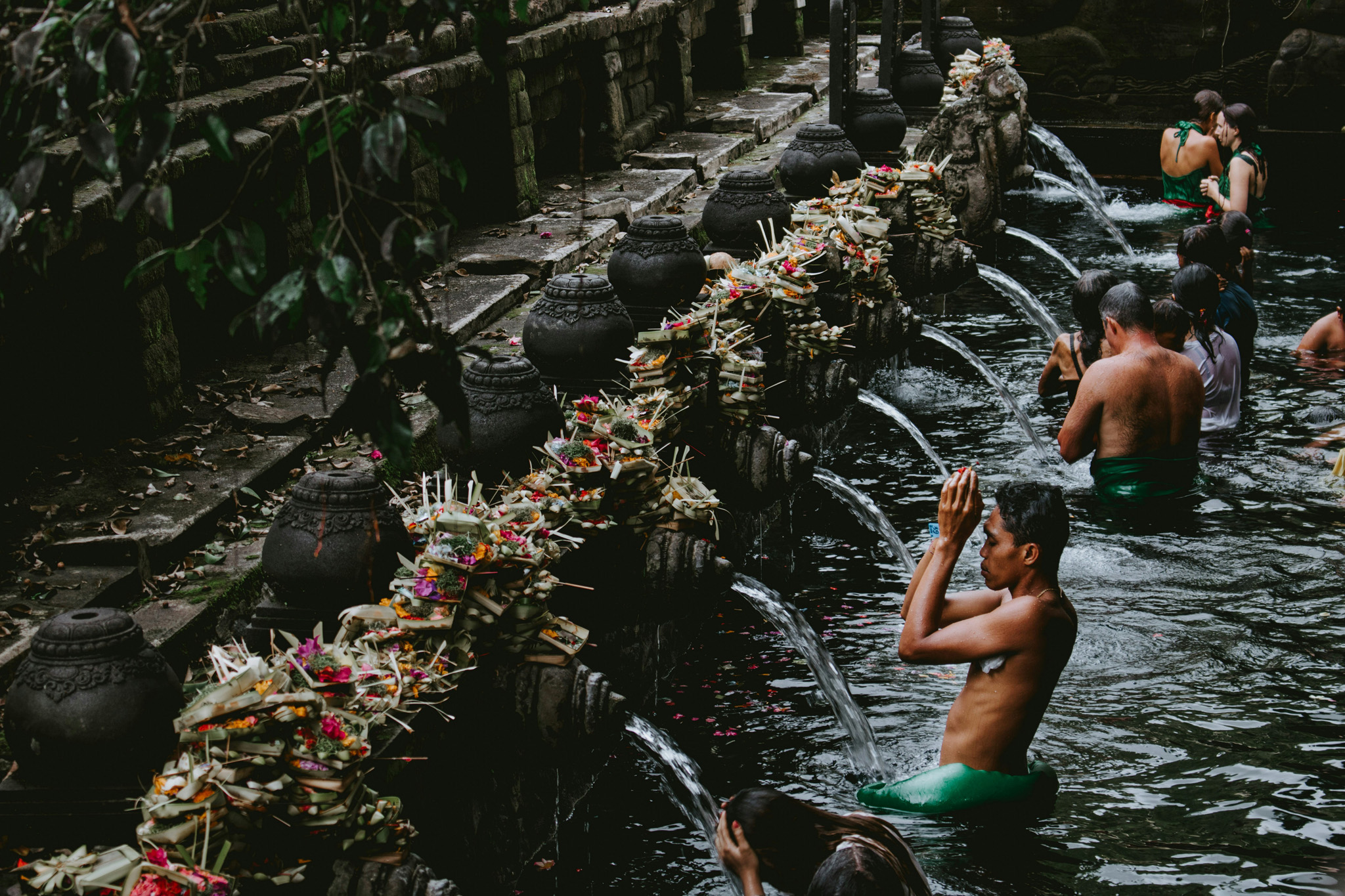Bali – Destination Guide
Bali, known as the “Island of the Gods,” is a tropical paradise famous for its lush landscapes, vibrant culture, world-class surf, and spiritual retreats. Whether you’re exploring ancient temples, surfing on golden beaches, or indulging in Balinese cuisine, Bali offers an unforgettable experience for every traveler.

Main Locations
🏝 Ubud – Bali’s cultural heart, surrounded by rice terraces, jungle retreats, traditional markets, and spiritual temples.
🏄♂️ Canggu – A trendy beach town known for surf spots, lively cafés, and a thriving digital nomad scene.
🌊 Uluwatu – Home to dramatic cliffs, stunning beaches, and world-class surf breaks, plus the famous Uluwatu Temple.
🌅 Seminyak – A stylish area with upscale beach clubs, boutique shopping, and vibrant nightlife.
🐠 Nusa Islands (Nusa Penida, Lembongan & Ceningan) – Crystal-clear waters, hidden beaches, and epic cliffside views.
🌋 Mount Batur & Kintamani – A volcanic region perfect for sunrise hikes and natural hot springs.
🐢 Menjangan & North Bali – A quieter escape with pristine diving, waterfalls, and authentic cultural experiences.
🏖 Gili Islands (Gili Trawangan, Gili Air & Gili Meno) – Laid-back island life with white sand beaches, incredible snorkeling, no cars or scooters, and unforgettable sunsets.

Highlights
🏄 Surfing – Bali is a surfer’s paradise, with beginner-friendly waves in Canggu and pro-level barrels in Uluwatu.
🏯 Temples & Culture – Visit stunning temples like Tanah Lot, Uluwatu, and Besakih, and experience traditional Balinese ceremonies.
🌿 Rice Terraces – The UNESCO-listed Tegalalang and Jatiluwih rice fields are breathtaking landscapes of green.
🧘♀️ Wellness & Yoga Retreats – Ubud is the perfect place for yoga, meditation, and healing retreats.
🌄 Mount Batur Sunrise Hike – Trek to the top of an active volcano for a spectacular sunrise.
🐠 Snorkeling & Diving – Explore vibrant coral reefs, manta rays, and shipwrecks at sites like Tulamben, Amed, and Menjangan Island.
🏖 Beach Clubs & Sunsets – Chill at iconic beach clubs like Potato Head, The Lawn, and Sundays Beach Club.
🏝️ Island Hopping – Take a boat trip to Nusa Penida, the Gili Islands, or Lombok for more pristine beaches and adventure.
💦 Waterfalls & Jungle Adventures – Chase waterfalls like Sekumpul, Tegenungan, and Gitgit, or go whitewater rafting in Ubud.

Arrival Airports & Transport
🛬 Ngurah Rai International Airport (DPS) – Located in Denpasar, this is Bali’s main airport with international and domestic flights.
🚖 Getting Around – Ride-hailing apps like Grab & Gojek are available, but renting a scooter is the most popular way to explore. Private drivers can be hired for longer trips.
🚢 Boats & Ferries – Speedboats connect Bali to Nusa Penida, the Gili Islands, and Lombok.
Practical Information
💰 Currency – Indonesian Rupiah (IDR). Cash is useful for markets and small vendors, but most places accept cards.
💳 Cash vs. Card – ATMs are widely available, but some charge high fees. Many restaurants, hotels, and shops accept credit cards.
🗣 Languages – Balinese and Bahasa Indonesia are spoken, but English is widely understood in tourist areas.
💸 Tipping – Not mandatory, but rounding up or leaving 5-10% for good service is appreciated.
🔌 Power Outlets – Type C & F (European-style, 220V). Bring a universal adapter.
🛂 Visa Information
Many travellers can get a Visa on Arrival (VOA) for 30 days, which can be extended once. This visa can be organised in advance online, which we highly recommend doing to avoid queues at the airport. In addition, all travellers are required to fill out an online All Indonesia Arrival Card before arrival at https://allindonesia.imigrasi.go.id/ . Make sure that you check the current requirements before travelling. For the most accurate and up-to-date information, please refer to the official Indonesian immigration website: https://evisa.imigrasi.go.id/front/info/evoa
📱 SIM/eSIM – Telkomsel and XL provide the best coverage. SIM cards can be purchased at the airport or convenience stores. Using an eSIM is our recommended choice while travelling anywhere in the world, and our recommended provider is Holafly. For more information on eSIMs, check out this blog.

🍛 Food & Cuisine
- Nasi Goreng & Mie Goreng – Classic Indonesian fried rice or noodles, often topped with a fried egg.
- Gado-Gado – A delicious Indonesian salad with peanut sauce.
- Babi Guling – Traditional Balinese roasted suckling pig, a must-try local specialty.
- Ikan Bakar – Grilled fresh fish, best enjoyed at a beachfront restaurant.
- Plant-Based Options – Bali is a haven for vegans, with plant-based cafés offering smoothie bowls, tempeh dishes, and raw treats.
- Jamu – A traditional herbal drink made from turmeric, ginger, and honey.
- Balinese Coffee & Luwak Coffee – Experience Bali’s strong, aromatic coffee or try the unique (and controversial) civet coffee.
🧳 Packing Guide
🌞 Clothing
- Light, breathable clothes (linen, cotton, or rayon work best)
- Swimsuits for the beach, pool, and snorkel spots
- Sarong or cover-up (handy for both beach and temple visits)
- Maxi dresses or shorts and tees for day exploring
- A light sweater or jacket for cooler evenings or air-conditioned spaces
- Flip flops/sandals for everyday wear
- Sneakers or walking shoes for exploring, hiking, or bike tours
🕌 Temple Etiquette
- Long skirt or pants (or bring a sarong)
- T-shirts or tops with sleeves to cover shoulders
- Easy slip-on shoes (many temples require removing footwear)
🏖️ Beach & Adventure Gear
- Sunglasses and hat (the sun is strong year-round)
- Reef-safe sunscreen (to protect both your skin and Bali’s coral reefs)
- Reusable water bottle (hydration is key in the heat)
- Quick-dry towel
- Snorkel mask if you want your own (though rentals are everywhere)
🧴 Toiletries & Health
- Insect repellent (mosquitoes love Bali evenings)
- After-sun lotion or aloe vera gel
- Personal meds, plus a small first aid kit (hydration salts can be lifesavers)
- Hand sanitizer and wet wipes
- Travel-sized shampoo/conditioner (most hotels provide basics)
📸 Tech & Travel Essentials
- Camera or GoPro for waterfalls, beaches, and rice terraces
- Power adapter: Bali uses type C & F plugs, 230V
- Portable charger for long days out
- Lightweight daypack for day trips
- Waterproof phone case or dry bag for boat trips
💰 Money & Docs
- Credit/debit cards (Visa and Mastercard are widely accepted)
- Some cash in Indonesian Rupiah (small notes useful for taxis, markets, tips)
- Travel insurance (essential for activities like diving or scooters)
- Copies of passport, bookings, and emergency contacts
🎒 Extras to Make Life Easier
- Light rain jacket or poncho (tropical showers can surprise you)
- Small lock for bags if you’re hopping between hotels
- Notebook/journal for memories
- A good book or Kindle for lazy hammock days
🩺 Health & Safety in Bali
Bali is a safe and welcoming destination, but it’s important to take a few health precautions to stay well and enjoy your trip to the fullest.
-
Only drink bottled or filtered water – no exceptions
Tap water in Bali is not safe to drink. This includes brushing your teeth or rinsing fruit and vegetables. Always use bottled or properly filtered water for drinking, brushing teeth, and washing any food you prepare. Most hotels and villas provide filtered water stations – refill your bottle there or purchase sealed bottled water from reliable shops. -
Be mindful of food hygiene
Bali’s food scene is incredible, but food safety standards vary. Stick to restaurants or food stalls with good reputations, high turnover, and visible cleanliness. Avoid raw or undercooked meats and seafood from questionable places, and wash hands frequently or use sanitiser. -
Pack essential travel medicines
We recommend bringing a small personal medical kit that includes:-
Electrolyte sachets for hydration
-
Anti-diarrhoea tablets (e.g. Imodium)
-
Antihistamines for allergies or bites
-
Paracetamol or ibuprofen
-
Antiseptic cream and plasters for minor cuts
-
Insect repellent with DEET or picaridin
-
-
Get comprehensive travel insurance
Make sure your policy covers medical expenses, hospitalisation, and evacuation, especially if you’re planning to surf, ride scooters, or take part in adventure activities. Bali has excellent private clinics, but serious cases may require evacuation to another country. -
Take care on the roads
Bali’s roads can be chaotic, especially for those unfamiliar with scooters or local driving habits. Helmets are not optional – they’re essential. If you’re not experienced riding a scooter, consider using a driver or rideshare apps like Grab. -
Protect yourself from the sun
The UV index is extremely high, even on cloudy days. Wear reef-safe sunscreen, sunglasses, and a hat – and avoid being in the sun during peak hours (11am–3pm) when possible.
By staying hydrated with safe water only, packing the right medicines, and using common-sense precautions, you’ll be set for a fun and healthy Bali adventure.
🙏 Traditional Customs & Cultural Etiquette
Bali’s culture is deeply spiritual, and locals are incredibly warm and respectful – and they appreciate it when visitors return the gesture. Understanding a few basic customs will help you connect more deeply with the island and its people.
-
Dress modestly at temples – Shoulders and knees should be covered. Sarongs and sashes are usually available for rent or loan at temple entrances, or you can bring your own.
-
Offerings are sacred – You’ll see small woven offerings (canang sari) with flowers, rice, and incense on sidewalks, shrines, and stairs. Step around them – never over them – and don’t touch unless invited to participate in a ceremony.
-
Respect ceremonies and rituals – If you come across a ceremony, admire from a respectful distance unless you’re invited to join. Always ask before taking photos of people, especially during religious events.
-
Use your right hand – When handing something to someone or receiving a gift, use your right hand or both hands. The left hand is traditionally considered impolite for exchanges.
-
Remove shoes before entering homes – If visiting someone’s home or entering a traditional space, take your shoes off at the door unless told otherwise.
By embracing Balinese customs with curiosity and respect, you’ll not only be a more thoughtful guest – you’ll also have a far richer and more meaningful travel experience.
Why Visit?
Bali blends tropical beauty with rich culture, adventure, and relaxation. Whether you’re chasing waterfalls, diving into the ocean, or finding peace in a yoga retreat, the island has something for everyone.


